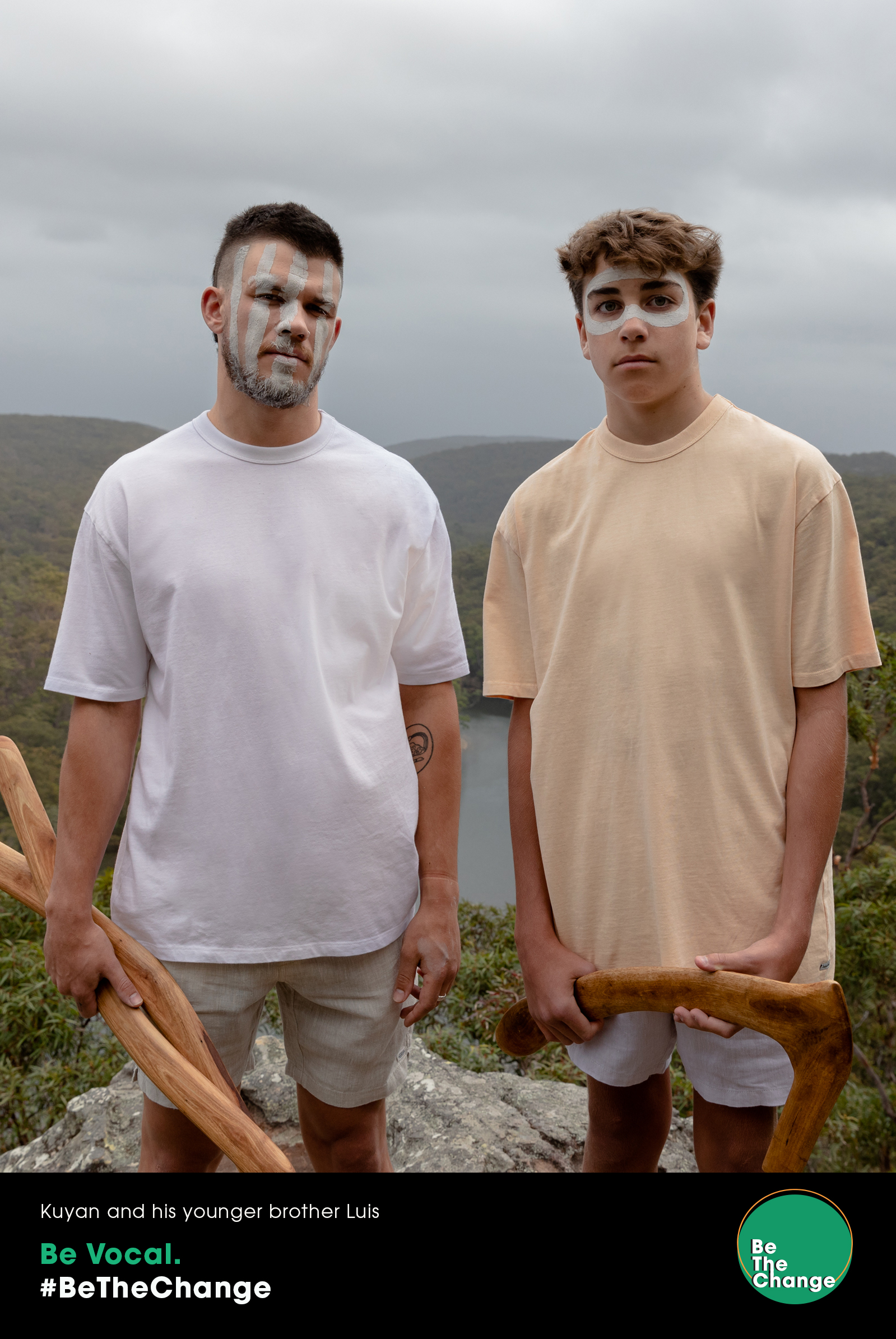Domestic and family violence and abuse is still considered a private domain when it is a public issue. Weave’s Be The Change campaign was created to raise awareness of this issue and educate and empower our communities to be involved, to be vocal, to be true, to be supportive, to be non-judgemental and to be an advocate.
At Weave, we believe we all have a responsibility to create a society where domestic and family violence and abuse is never tolerated or accepted. We are committed to continuing to advocate for systemic change and being part of breaking the cycle of violence.
Each year, during during the 16 Days of Activism against Gender-Based Violence, we focus on different aspects of domestic and family violence and abuse with our Be The Change Campaign. These portraits are of 6 men who are connected to Weave and who embody the values of our ‘Be The Change’ campaign – Be Vocal, Be True, Be Supportive, Be Non-Judgemental, Be an Advocate. Read their stories below.
Our hope is that more men will feel empowered to be involved in conversations about this issue and to take action if someone in their life is experiencing domestic violence and abuse.
We encourage you to reflect on which ‘Be The Change’ values resonate the most with you. How will you commit to being true, being supportive, being non-judgemental, being vocal, being involved and being an advocate?
Join us, and Be The Change.
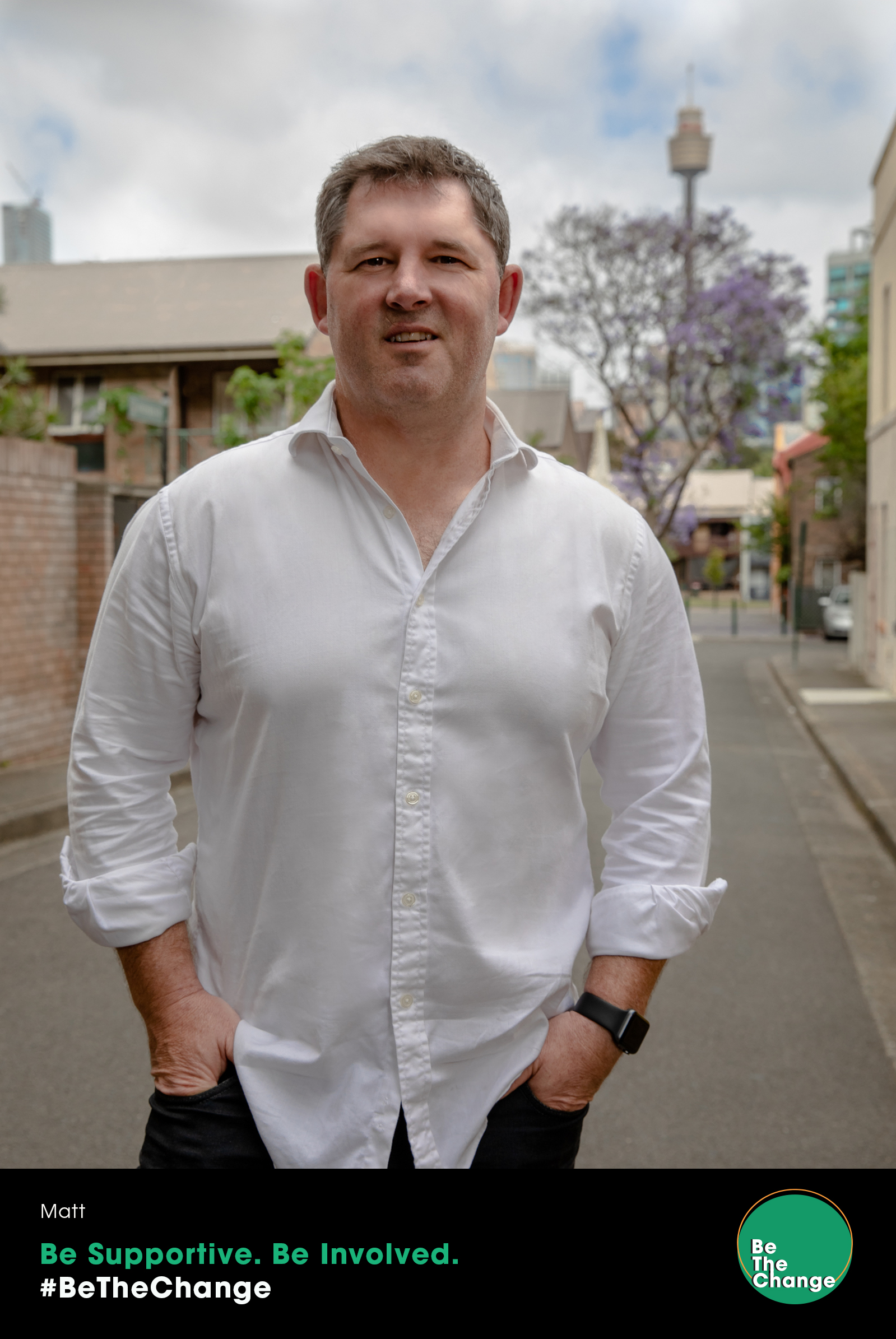
Matt | Be Supportive, Be Non-Judgemental, Be Involved.
Matt Lonegran started a removalist company Moving Against Domestic Violence (Movers) in 2015 and has been supporting Weave clients experiencing domestic violence who have to move to a safer housing option.
One phone call from a friend was all it took for Matt to open his eyes to the issues of domestic violence and the need for practical help. “A friend called me and asked if I still had my transport business. I said no but I could hook him up. He said not for him but for a friend of his who was in a domestic violence situation and needed to get out urgently. I dropped everything called a mate with a truck and got her out. It all started from there.
Men don’t speak about these topics until they’re invited. Given the chance to have a voice, men will. I feel comfortable talking to men in my life about these issues. What we try and do at Movers is allow men to get involved in making a change. We talk about a safe escape, a sustainable escape. So a safe escape is get the families out, and a sustainable escape is starting to look at helping them stay out. Our Board is all men attempting to drive change how we can, in a practical way.” – Matt
Portrait by Tristan Stefan Edouard.
#BeTheChange
Kobie Dee | Be True. Be an Advocate.
Kobie, and his daughter Kallie, pictured at home.
Kobie is a 23 year old Gomeroi man who has been connected to Weave since he was 10 years old. He is a talented music artist with an innate gift for story-telling and connecting with young people. As an artist, he is deeply connected to his community through performance and community work.
“I’ve been involved with Weave for a long time and I’m now a Weave Advocate. I started out on the Kool Kids program and I have been connected ever since. Weave is a big part of my life and I feel grateful for all the support I have received over the years, and the access to opportunities that have changed my life.
I’m on a journey to becoming a better man and a better father. Some of my friends and I are part of a Cultural Healing Group, and together we’re constantly having conversations about what our responsibility is to our community and younger generations.
We’ve all experienced trauma in our lives, for me, it’s important to be actively working towards breaking cycles of trauma, especially as I’m a young dad raising my daughter.
Being true really resonates with me because once I started being true to myself I was able to start being true to others and stand up for what I believe in. Leading by example by actually “being the change” Is the best form of advocacy to stop violence and abuse.” – Kobie
Portrait by Tristan Stefan Edouard
#BeTheChange
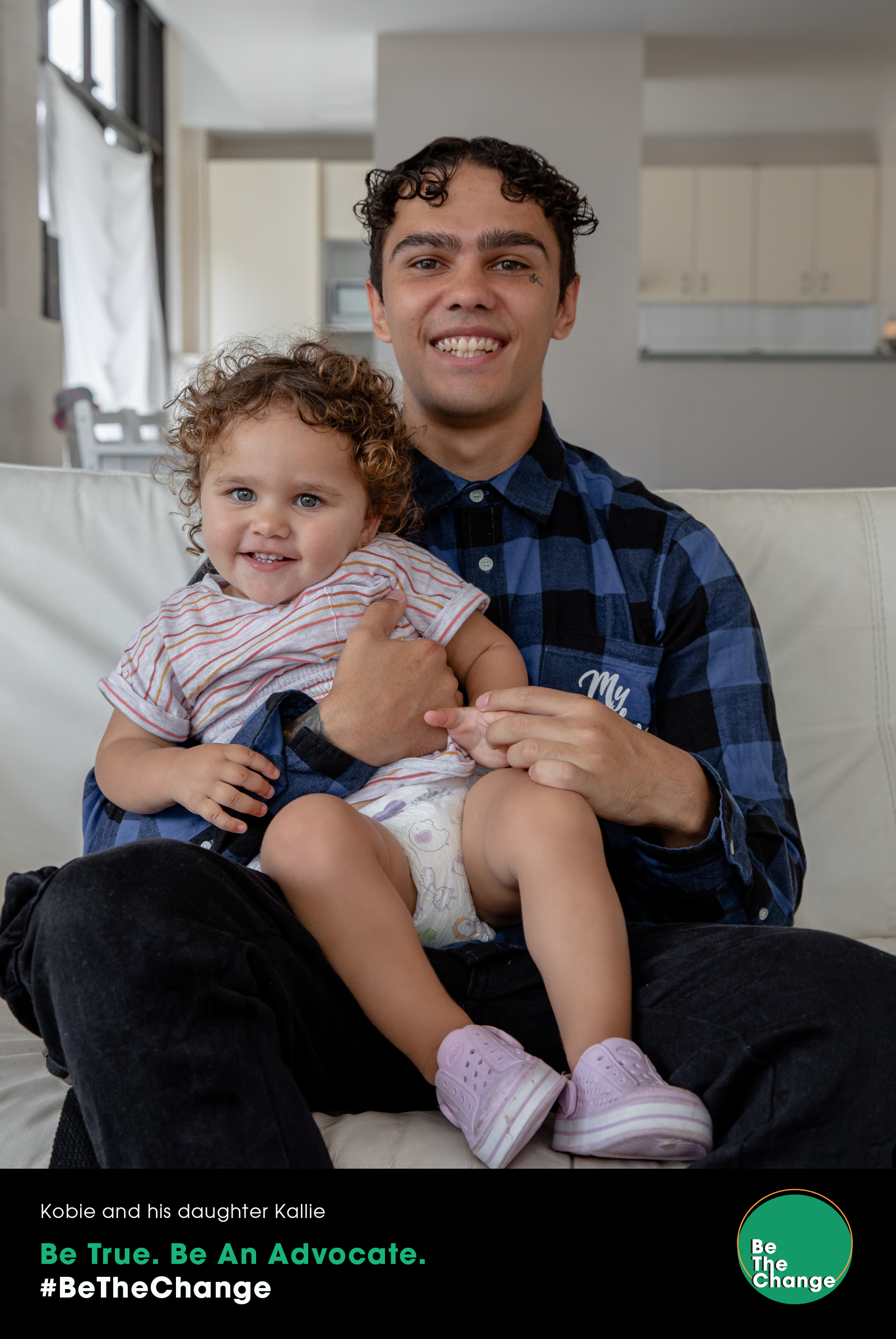
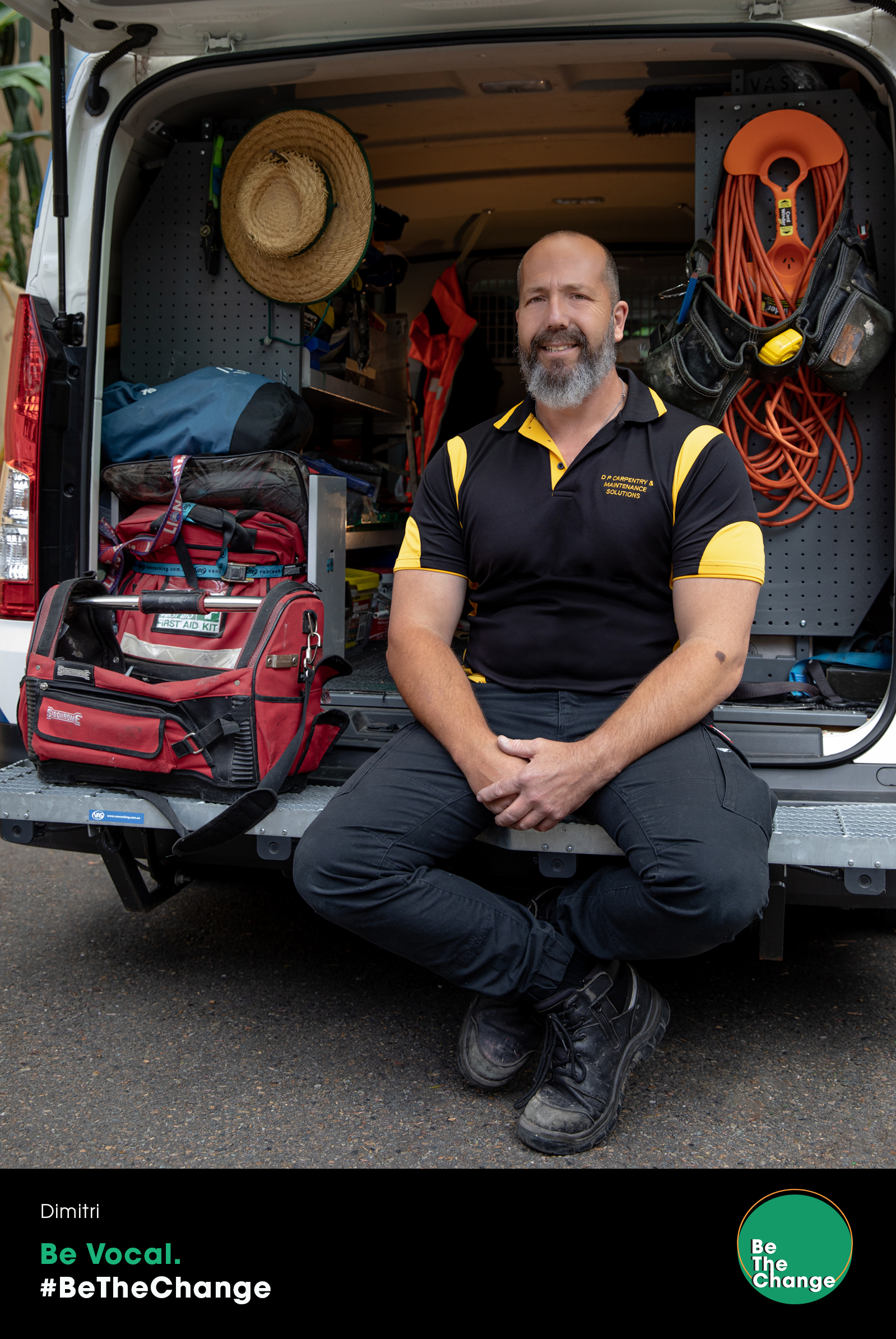
Dimitri | Be Vocal.
Dimitri is an experienced carpenter and tradesman who provides support to Weave clients by providing home security upgrades that allow women and children to safely remain in their own homes. A home security upgrade could include installing a custom security door or securing windows and building a safe room. Dimitri’s skill set is broad and allows us to create tailored security upgrades best suited to each unique set of circumstances that our clients face.
Dimitri has been working with Weave’s Domestic and Family Violence Program for 11 years and brings expertise and sensitivity to each and every situation.
“Be Vocal. It’s important to speak up. Men can be advocates by speaking out and supporting organisations like Weave, which is fantastic. You’re more of a man if you speak out than if you don’t say anything.” – Dimitri
Portrait by Tristan Stefan Edouard
#BeTheChange
Uncle Dean, Aboriginal Community Cultural Leader | Be Supportive. Be Vocal.
“I’ve supported Weave through cultural programs for a number of years now. I recently did a camp with 9 young men from Weave who asked to come and do this cultural stuff and now I’m a Board Member for Weave. I see Weave as a really good organisation who are doing good things in the community so I’ll keep on supporting them.
We look a lot at self and what we need to do as an individual to become better people and one of our first lessons is about respecting women. If we can learn that stuff pretty early we can make a change and make a difference in what we do.
Domestic violence is not a topic a lot of men talk about. It’s a closed door thing, a lot of it happens out of sight out of mind.
I think one of the barriers for men and being able to make change, is for them to deal with their own emotions, to be able to talk and not feel as though they’re being weak because they show emotion. Even to shed a tear is a strength because it shows you that you’re showing those emotions. It’s about men speaking about this stuff, and looking at their experiences, what they’ve seen and what they’ve lived. Once you’ve lived something you tend to never forget it, and then that living research can help others.” – Uncle Dean
Portrait by Tristan Stefan Edouard
#BeTheChange
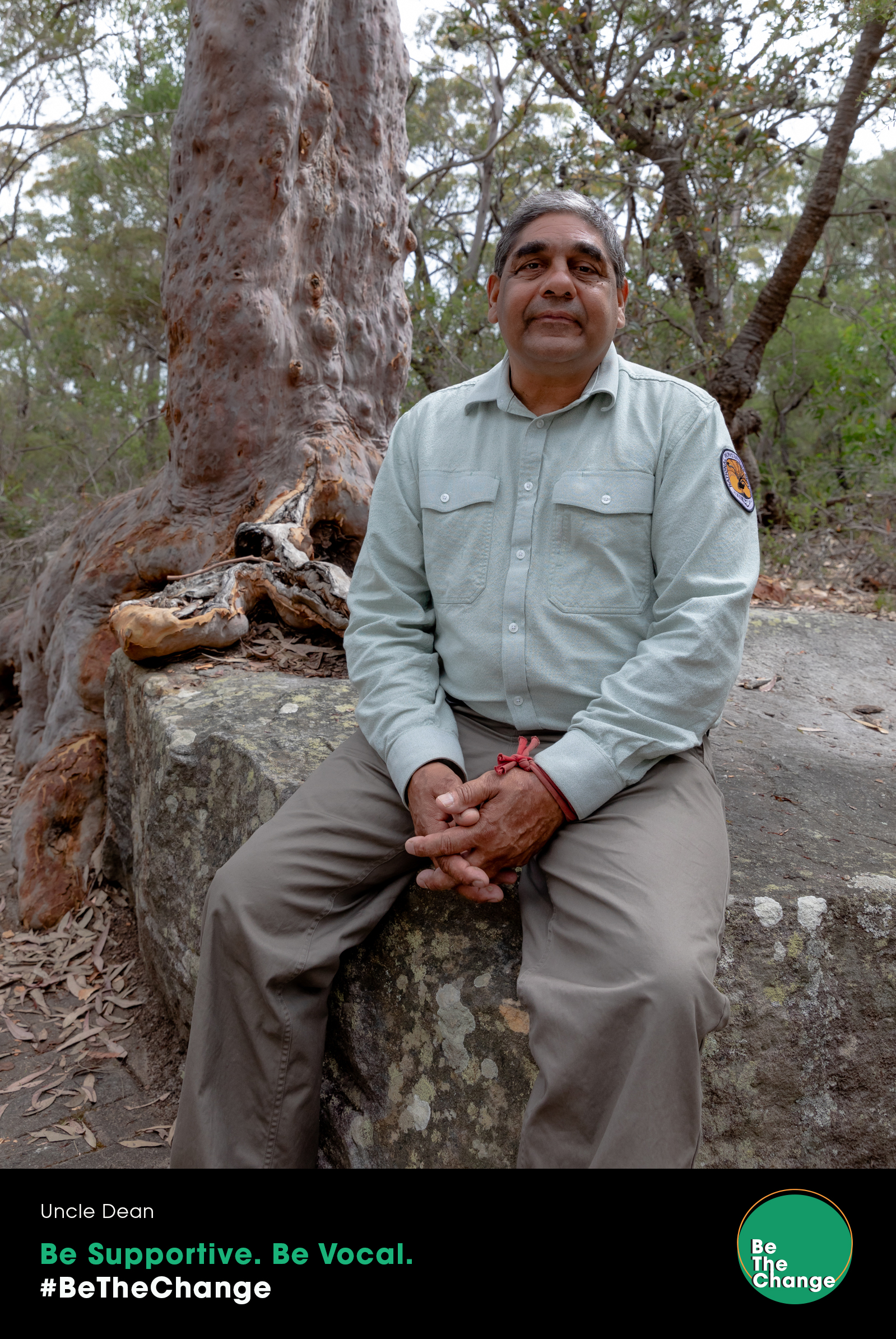
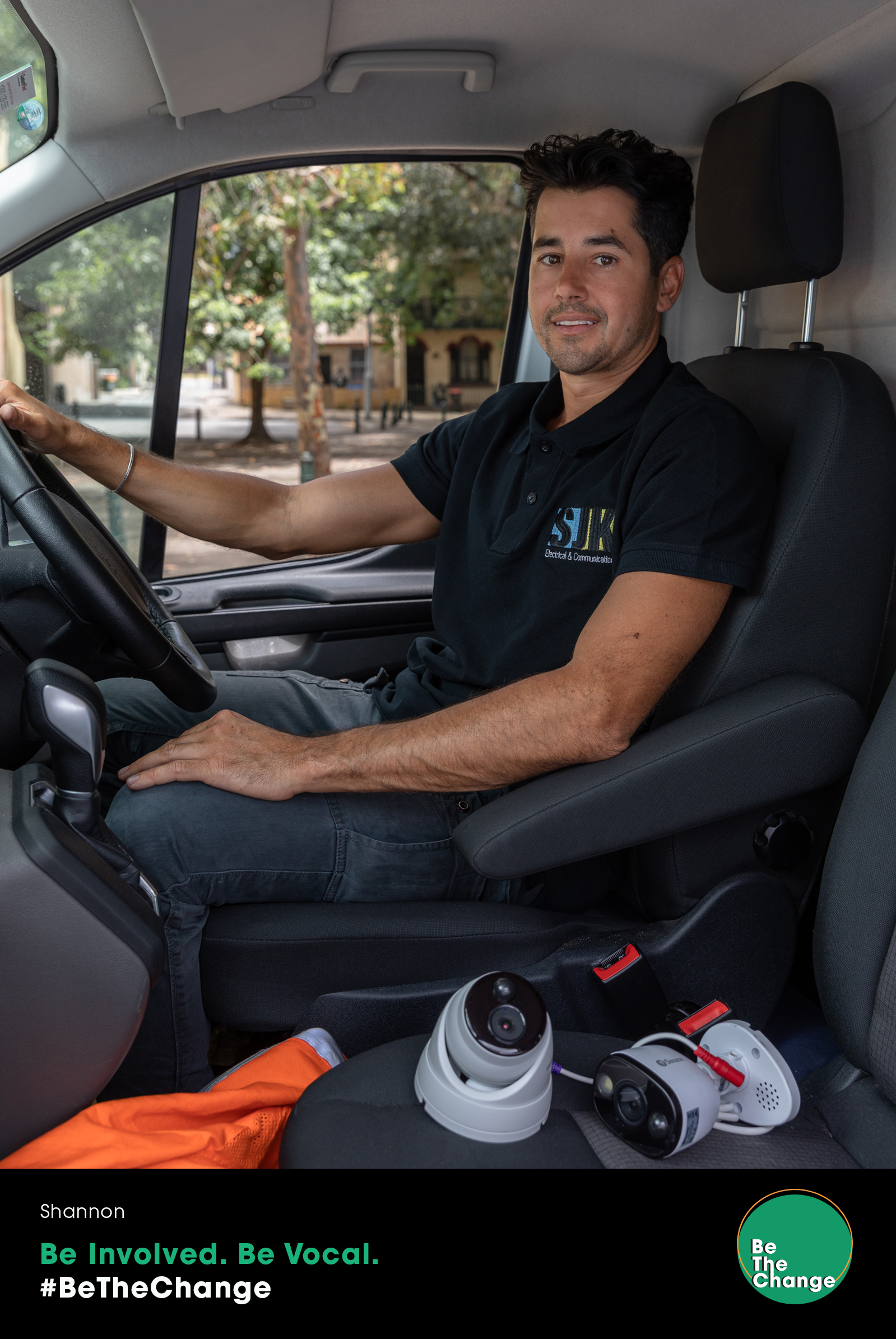
Shannon | Be Involved. Be Vocal.
Shannon specialises in the installation of premium security cameras and security lighting for women and children who are experiencing domestic and family violence. Through Weave’s Domestic and Family Violence Program, we work with women to provide home security upgrades, that allow women and children to safely remain in their own homes.
Shannon’s calm, compassionate and respectful nature creates a sense of ease for each client that we work with which is invaluable in these sensitive situations.
“Domestic violence is a big issue in society and since having the opportunity to work with Weave, I’ve realised it’s an even bigger issue than what I thought. It’s rewarding to be able to make a difference, big or small. Being supportive and being involved is important. It’s not a general topic that comes up between men, unfortunately. Men can advocate for positive change in this area by speaking out more openly and educating themselves and each other about this issue.” – Shannon
Portrait by Tristan Stefan Edouard
#BeTheChange
Kuyan | Be Vocal.
Kuyan and his younger brother Luis, pictured at the Royal National Park.
Kuyan is a Wiradjuri man, from Cowra NSW who works as a caseworker at Youth Justice in Sydney.
“‘Be vocal’ resonates with me as it highlights the important role of men being vocal in our peer groups and wider communities and talking about domestic violence. It’s rare for it to come up as a topic of conversation, but an important part of raising awareness and creating change is feeling confident to speak to your mates about these issues.
Talking to a perpetrator about behaviour you deem as wrong is always difficult, especially when it’s someone close to you, but we have to call it out.
Throughout my life, it’s been important to understand what it means to be an Aboriginal man. A strong part of our culture is respect for mother earth and through that respect for women and mothers. The respect for mother earth is at the very core, and that respect passes on to the women we come in contact with in our lives, whether that’s our mum, our grandmothers or any women that we have any type of relationship with. Whether it’s someone we have a passing contact with or someone we have a close relationship with.
In my life I’ve been privileged to have different men who have been mentors to me and invested in me and I’ve learnt alot from them. I think it’s important to recognise the role and responsibility we have in sharing with men around us, particularly young people. For me that’s through my work and through being a big brother.
Our mum is a domestic violence caseworker and a strong advocate for women, and my little brother and I feel grateful that awareness of these issues and conversations about this has always been around us.” – Kuyan
Portrait by Tristan Stefan Edouard
#BeTheChange
